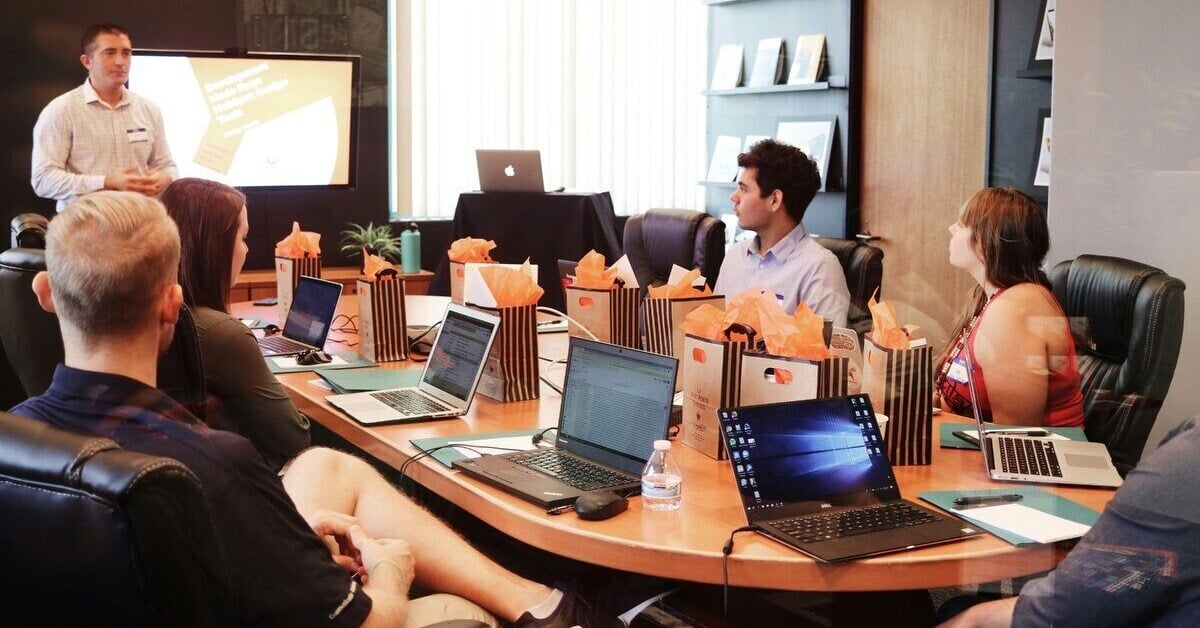Why adaptive learning is the future of corporate training

The old way of training employees using dry, "click-next" eLearning isn't meeting the evolving demands of how adults actually synthesize and process information. Employees need a modern approach to training that feels relevant, customized, and engaging. Since organizations want efficiency, measurable outcomes, and impactful skill development, the only way to achieve all these goals is by using adaptive learning. This is one of the most promising approaches to training, since it takes employees on an interactive journey of skill development.
Adaptive learning is a bit like one of those "choose your own adventure" stories where every decision determines what comes next. Employees gain the ability to build their skills in a constructive and engaging way. An adaptive simulation platform has this embedded at its core. As employees go through the simulation, they get an advanced, real-time learning experience. No more ticking boxes or going through the motions.
Let's dive in and see precisely why adaptive learning works and how it can impact your organization's training outcomes. Take a look at ETU's philosophy on adaptive learning in this short video overview:
The problem with standardized training
Most corporate training is a one-size-fits-all experience. In traditional e-learning, employees are often forced to go through generic content that doesn't take into consideration their unique skill level. This results in very low engagement, long seat times, and zero real-world application.
Adaptive learning flips that model on its head. Through constant assessment and response to each individual learner's skills, adaptive platforms can route employees to relevant and practical scenarios, therefore creating more effective and engaging training experiences.
How an adaptive learning platform works
The ETU platform is adaptive in nature, which means that it continuously adjusts its learning curve based on the performance of its user, and it does so in real time. ETU doesn’t just build "virtual scenes" that employees go through. Adaptive learning is an actual simulation of on-the-job situations, which dynamically change along with decisions employees make. Here's how that happens:
- Branching simulations: Learners are presented with a scenario-based simulation that uses realistic workplace activities. Like in a "choose your own adventure" story, every decision they make determines what happens next on their journey, with routes that branch off.
- Real-time skill adjustment: Unlike many platforms, which adapt based on a surface level of knowledge, ETU goes deeper. It continuously evaluates the learner's skills based on choices and adapts either by advancing them or rerouting them for further development. This keeps employees engaged, helps them learn what is relevant, and skips over what they have already mastered.
- Reduced seat time/cost savings: ETU's adaptive simulations eliminate unnecessary “fluff” often found in traditional e-learning. This cuts seat time by 30-50%. Organizations can then accelerate learning and drastically cut costs. Employees learn faster, do their job better, and get back to work quicker.
Why adaptive learning is like a “choose your own adventure”
Think of adaptive learning as a skill-building quest where every employee is dropped into an “on-the-job” scenario. Rather than passively absorbing the knowledge, each team member makes decisions, responds to challenges, and gets feedback that sets their route in one direction or another.
High-performing learners speed through, bypassing redundant training, while underperformers get coaching to close very specific skill gaps. This ensures all employees walk away with the exact skill sets needed to perform on the job.
This approach not only enhances engagement, but it also allows companies to benchmark the skills of the employees accurately. Managers can measure the proficiency of their employee, identify who needs more resources, and who's ready for higher-level training. It is targeted, relevant, and truly impactful.
How adaptive learning benefits companies strategically
- Scalable personalized training: While scaling personalized training in a large organization can be cumbersome, ETU's platform makes this a reality by crafting a unique learning path for each learner based on individual actions and progress. As a result, companies can train on everything without putting employees through boring courses or manuals.
- Interactive engagement: This approach isn't just about knowing something; it's about developing real-world capability that employees remember and use.
- Faster competency, lower costs: Adaptive learning allows companies to save on training costs. With faster employee skills acquisition, productivity rises and shortens the gap between training and practice.
- Rich performance metrics: Adaptive learning pathways also provide real data. You’ll see skill gaps, underperforming teams, and more to make better decisions.
Why learning-by-doing is essential for corporate training
Adaptive learning helps companies recreate real-life settings for an employee. This is not passive training. It is an active, hands-on process where employees learn by doing rather than theoretical knowledge. This process improves knowledge retention and allows employees to move ahead and try their skills in the risk-free setting. Immediate feedback at every decision point reinforces the skill set as well.
Simply put, learning-by-doing is more effective. It is vital in a corporate environment where employees need to be prepared and confident.
Ready to implement adaptive learning?
Adaptive learning represents a unique opportunity for enterprises to reshape one-way training into a modern, dynamic process of skills development, allowing each employee to develop from their unique starting point.
Test drive an ETU simulation here and experience the adaptive learning difference yourself.

